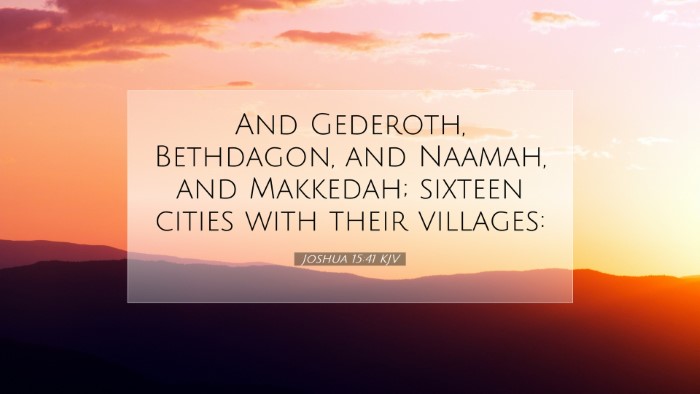Commentary on Joshua 15:41
Verse (Joshua 15:41): "And Gath, and its towns, and Ekron, and its towns."
Context and Historical Background
The verse where Gath and Ekron are mentioned is a part of a larger narrative concerning the division of the Promised Land among the tribes of Israel. This allocation follows the conquest of Canaan under the leadership of Joshua, reflecting God's promise to His people. Gath was one of the major cities of the Philistines, while Ekron similarly holds significance in relation to both the Philistine dominance and Israel's territorial aspirations.
Insights from Matthew Henry
Matthew Henry focuses on the importance of the cities that are named and emphasizes their strategic importance. Gath is known as the birthplace of Goliath, which serves as a reminder of the Philistine's continual threat to Israel. Henry notes the duality of God's judgment on the Philistines through Israel's conquest and the ongoing challenges Israel would face, indicating the need for vigilance and faithfulness to God.
Reflection from Albert Barnes
Albert Barnes provides further details about the geographical and cultural context. According to Barnes, Gath is often associated with strength and war, reflecting not only its military significance but also its role as a center of idolatry. He highlights how these cities contribute to the overall landscape of Israel's struggle against the pagan nations and the importance of maintaining obedience to God in the face of such challenges.
Analysis by Adam Clarke
Adam Clarke delves into the etymology and historical significance of the names of these cities. He points out that Gath's name translates to "winepress," suggesting a place of oppression but also abundance. Clarke emphasizes the cultural significance of both cities in the context of Israel's history, especially regarding their pagan practices that persisted in the region. He calls attention to the need for purification and dedication to God as Israel settles into their promised inheritance.
Theological Implications
As researchers, theologians, and students reflect on Joshua 15:41, several themes emerge that bear importance for biblical understanding and application.
-
The Promise of Land:
The allocation of cities is a fulfillment of God’s covenant with Israel. This reminds believers of the faithfulness of God in fulfilling His promises.
-
Spiritual Warfare:
The mention of Gath and Ekron serves as a reminder of the spiritual battles that believers must continue to face against the forces that oppose them.
-
Covenant Faithfulness:
As Israel took possession of the land, it highlights the need for obedience to God's commands for continued blessing and possession of the inheritance.
-
Judgment of Nations:
The listing of Philistine cities reflects God's judgment against pagan nations, serving as a theological reminder of God's sovereignty over nations and their eventual account to Him.
Conclusion
The focus on Gath and Ekron in Joshua 15:41, while seemingly a mere geographical note, opens up significant theological reflections about the promises of God, spiritual warfare, and the presence of idolatry among the people of God. Understanding this verse in light of the overall narrative of Scripture provides a deeper appreciation for God's faithfulness, the ongoing challenge of maintaining fidelity to Him amidst opposition, and the call for believers today to remain vigilant against spiritual complacency. The insights from Matthew Henry, Albert Barnes, and Adam Clarke converge to enrich our understanding of this pivotal moment in Israel's history.


